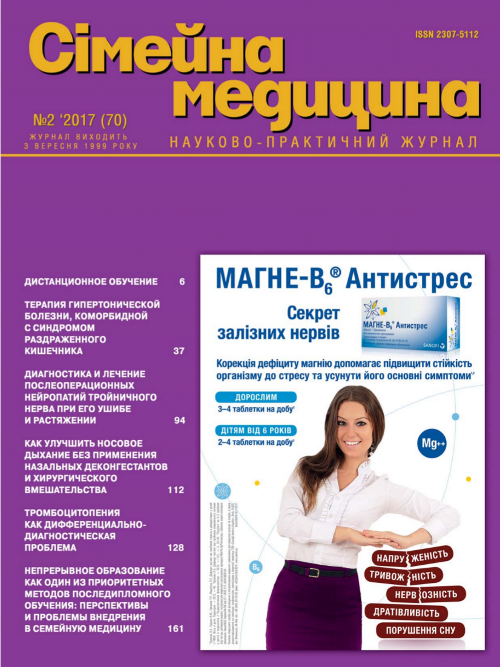Neurovegetative and cognitive impairments associated with anxiety in middle-aged patients with underlying cerebrovascular diseases
##plugins.themes.bootstrap3.article.main##
Abstract
The objective: analysis of the treatment efficacy and safety of neurovegetative and cognitive impairments associated with anxiety in middle-aged patients with underlying cerebrovascular diseases (CVD)
by means of Adaptol® medication.
Patients and methods. There were examined 60 patients, aged 42 to 58, having neurovegetative as well as light and mild cognitive impairments with underlying anxiety and depressive disorders (30 patients – main group, treatment with Adaptol® administration, 30 patients – control group: standard treatment without Adaptol® administration). The study of cognitive, vegetative and neuropsychological disorders was performed with the use of clinical scales. We determined the cortisol levels: before the treatment,on the 7th day of treatment and after
this treatment.
Results. It was determined that the patients with chronic cerebrovascular diseases CVD of young and middle-age, have mild to moderate cognitive impairments with underlying vegetative and anxiety disorders. Revealed impairments are corrected well by administering promptly of antihypertensive, metabolic, lipid lowering, and glucose–lowering therapy and also by means of minor tranquilizer Adaptol® produced by Olaynfarm company, at the dose of 300 mg twice a day for 28 days period. The treatment resulted in a statistically significant decrease of autonomic dysfunction, situational and personal anxiety and in the improved cognitive functions according to MoCa scale in patients taking Adaptol® in comparison to the data before the treatment. The level of cortisol in the blood plasma decreased gradually after 7 days of treatment and on the 28th day reached a statistically significant difference (p<0,05) when we compared the patients’ baseline parameters in the main group who received Adaptol® to those ones of the control group patients.
Conclusions. Patients with early signs of chronic CVD were diagnosed with cognitive and anxiety disorders with underlying neuroveg etative syndrome which required treatment. Minor tranquilizer Adaptol® produced by Olaynfarm company is recommended for treatment of psycho emotional disorders in middle aged patients with underlying neurovegetative syndrome as a part of an anxiety disorder.
##plugins.themes.bootstrap3.article.details##

This work is licensed under a Creative Commons Attribution 4.0 International License.
Authors retain the copyright and grant the journal the first publication of original scientific articles under the Creative Commons Attribution 4.0 International License, which allows others to distribute work with acknowledgment of authorship and first publication in this journal.
References
Аведисова А.С Антиастенические препараты как терапия первого выбора при астенических расстройствах [Электронный ресурс] / А.С. Аведисова // МедВопрос. Медицинский портал. – 26 августа 2013 г. – Режим доступа. – http://www.medvopros.com/view_story/Antiastenicheskie-preparaty-kak-terapiya-pervogo-vybora-pri-astenicheskih-rasstroystvah/43
Артериальная гипертония и качество жизни (тревога, депрессия, когниция) / С.И. Дроздецкий, К.В. Кучин, В.Н. Макаров [и др.] // Медицинский альманах. – 2011. – No 3 (16). – С. 48–50.
Белялов Ф.И. Значение психических факторов в клинике внутренних болезней [Электронный ресурс] / Ф.И. Белялов // Психические расстройства в общей медицине. – 2011. – No 2. – С. 4–8.
Варакин Ю.Я. Возможность предупреждения развития и прогрессирования нарушений когнитивных функций у пациентов с первичной хронической цереброваскулярной патологией / Ю.Я. Варакин // Нервные болезни. – 2012. – No 4. – С. 39–45.
Дамулин И.В. Когнитивные расстройства сосудистого генеза: патогенетические, клинические и терапевтические аспекты / И.В. Дамулин // Нервные болезни. – 2012. – No 4. – С. 14–20.
Живолупов С.А. Современный клинический анализ цереброваскулярных заболеваний: узловые вопросы дифференциальной диагностики и патогенетического лечения / С.А. Живолупов, И.Н. Самарцев // Фарматека. – 2012. – No 7. – С. 87–94.
Захаров В.В. Нервно психические нарушения: диагностические тесты / В.В. Захаров, Т.Г. Вознесенская. – 2-е изд. – М.: МЕДпресс информ, 2013. – 320 с. – С. 11–13.
Патогенетический и фармакологический подход при выборе антидепрессантов / М.Ю. Дробижев, О.В. Сердюк, А.А. Овчинников [и др.] // Социальная и клиническая психиатрия. – 2014. – Т. 24, No 2. – С. 86–91.
Сулейманова Я.Р. Хроническая цереброваскулярная патология в неврологической практике [Электронный ресурс] // Я.Р. Сулейманова, И.А. Лысенко, И.Н. Долгова – Режим доступа. – http://www.scienceforum.ru/2015/pdf/16279.pdf





